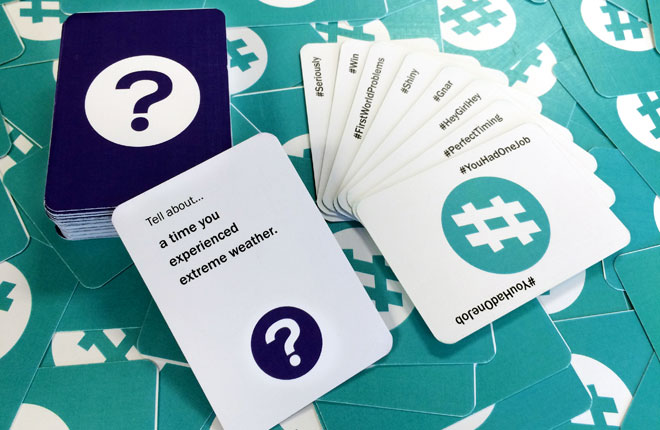We recently launched Professor Meeple’s Game Lab in an effort to uncover the world of indie games and designers, and share it with you, our guests. The response from independent game designers has been tremendous! We are thrilled to have already been able to share some great games with you, and we have quite a few more on the way!
One of the first entrants into Professor Meeple’s Game Lab was #storytags, an interactive storytelling game for small groups. “Above the Table” games that encourage social interaction are some of my personal favorites, so I definitely have my eye on this one.
Alyse Cappacio, co-designer of #storytags along with her husband Danny Cappacio, joins us to describe a bit about the history of the game’s development.
During Danny’s second semester of Experience Design grad school, he had a workshop that had a goal to create a game for older people. During this project, he created the first version of the game, which had no name. Looking through the brainstorming sessions and thinking about how to bridge the generational gap, he settled on storytelling as the main mechanic. The idea was to tap into the rich history of storytelling in families like bedtime stories and reminiscing about funny things. As a mechanic to promote interaction, Danny tried requiring players to say certain words that they had in their hand in order to gain points. This didn’t work because people just say the words, rather than using them for more inspiration. The game was broken.
Enter the idea that other players would tag your story. This was the best idea we’d had yet because it enabled other people to qualify your story without necessarily breaking the game. Players could tell the stories they wanted to tell, but didn’t have to modify or tailor their story to an arbitrary card to get points. We changed the name to “#Hashtag the game” at the recommendation of a couple friends. We also changed designs to a simple and flat vector # and filled it in with bright and lively colors.
At this point we decided to pursue production of the game and Alyse joined in on the process. We consistently got very positive responses while we were playtesting. It felt like a game that could catch on and be appealing to a wide audience. We then continued refining the rules and adding new prompts. What makes a good prompt? It has to be generic enough to apply to a large number of people, but specific enough to actually help generate good stories. We found that hyper specific prompts generated the best stories, but weren’t applicable to enough people. And as we playtested, we modified, deleted, and created new prompts to fill in the gaps where we lacked relevant cards. The same thing happened with the hashtags, but we gutted a lot of cards that were just adjectives and then added in a bunch of memes & colloquial phrases. Things like “SorryNotSorry” and “BadMommy” were trending hashtags to be used, both for variety in the deck, and for pop-culture relevance. But we didn’t want to load the deck entirely with these phrases because – as with the prompts – the more specific the phrase the less often it could be used. We’ve provided a lot of variety in this game to reach the widest audience possible – with the possibility to expand into niche groups as necessary.
The scoring continued to be a big hang-up. We honestly didn’t care to even keep score because the gameplay itself was rewarding enough without scoring, but we found a lot of people that need an objective to win in order to play a game. So scoring worked like this: We would write every players’ name down and just keep a running tally of points. Each hashtag card scored points – 2 for the player who played it and 1 for the storyteller. This meant after each story, the game would stop, and everyone would have to announce their cards and wait for the scorekeeper to total it up. This was a laborious task we knew we needed to fix. One day it finally clicked. Instead of a single score-keeper, we decided to utilize score tokens or as we call them “followers”. Each player would manage their own score. And this also allowed us to enable the loss of followers, which was unrealistic when scoring with tallies. With our scorekeeping solved, we felt ready to make this game.
At this point, we asked a lawyer if there was an existing trademark registration for #Hashtag and found that there was. We had to change the name to something that wasn’t already taken. So we changed the name to #Storytags. Although, this was almost immediately before launching the Kickstarter so we had a bunch of graphics to modify and had to dub-over the video. We are ultimately happy about the name change, though, because we found the name #Hashtag was a turn-off for non-millenials. #Storytags is also much more future-proof, so we can continue production of the game in the future if the use of hashtags goes by the wayside.
Editor’s Note: #storytags is currently on Kickstarter, with a just a few days left in the campaign. I strongly recommend checking it out, and seeing if this might be a game for you!
Jim Reed is a lifelong gamer who started with the original red box Dungeons & Dragons. After spending 20 years in the corporate world, he decided it was high time that work be fun and struck out on his own. Jim now owns and operates Ravenwood Castle and The Malted Meeple, and spends his days ensuring his guests have as much fun as he does.

